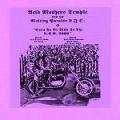
Rating: 6/10
Originally formed in Los Angeles in 2000 and currently established in Omaha, Consafos is a nicotine-stained, feminine and more ethereal version of Tindersticks - but where Stuart Staples manages to create little pockets of gravity for his gloomy vocals to travel, this Midwest five-piece ensemble takes the path of least resistance when it comes to placing the various elements together. They are well-intentioned, but sadly on Tilting at Windmills they become fossilized a little too soon.
Whenever “On and On” emerges from the stereo, it feels like they’ve just returned from a private lesson from no less than Hope Sandoval; its sepia-driven, folksy feel segues into the beautiful trumpet solo, but afterwards sounds amorphous and deviant that it’s difficult to see the intended direction. By the time the title track evolves with the gentle violin and the vibraphone, you have come up with the band’s underlying equation: Consafos’ interest grows in inverse proportion to the amount of influences they leave behind.
Sadly, most of the time they seem too attached to a background that guides, but also limits, their choices. In fact, Stefanie Drootin’s vocals - unnervingly reminiscent of Neko Case and Margo Timmins (Cowboy Junkies) - send these acoustic gems to the stratosphere, but for rotten pay. Also a member of Bright Eyes and The Good Life, the vocalist tames the apparently untamed drooling effect of her lyrics by seducing and deducing a whole universe from her front porch.
The spell is nevertheless broken when “Chelsea’s Got a Knife” reveals its telluric existence at the last minute. Add to this the harmonica on “Wide Eyed”, which reconfigures all established priorities and sends the listener back to the misty forest; by then it’s too late to haunt and confuse the hangers on. Consafos succeed in showing the path to light, but they finish this illumination after the fourth or fifth song; every latter attempt to walk the same way sounds false, like an anathema to the correct fruition of this work.
From “Broken Record” on, the album enters an infatuated state of epiglottal trance that infuriates any listener who fell in love at first sight. For the second half of this, the band repeats itself, sounding like margin walkers with way less charm than previously shown. Only Laura Watral’s violin is truly necessary and irreplaceable, salvaging the tone. Over all, this should have been an EP instead of a full-length, as sometimes, half the duration means double the delight.
http://www.lostatsea.net/review.phtml?id=153367602542b559ee8f2a7



